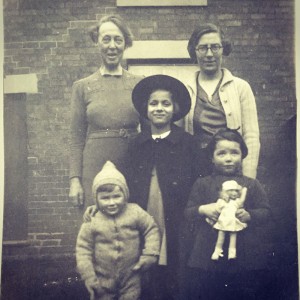Shoah Foundation’s Virtual Archive Purchased by CSUN Library to Preserve History

Ruth Ellen Glücksmann (center) in Margate, England in 1939, pictured with her foster mother, unknown woman and other foster children, shortly after arriving in England via the Kindertransport in May of 1939 from the Heim Isenberg home in Neu Isenberg, near Frankfurt Am Mein, for unmarried Jewish women and their children. Submitted by Caroline Keefer courtesy of USC.
The library at California State University, Northridge, recently purchased the USC Shoah Foundation Institute’s visual history archive. The Archive contains more than 53,000 personal testimonies from survivors and witnesses of the Holocaust, as well as other atrocities such as the Armenian Genocide, Tutsi Genocide, Nanjing Massacre, and the Guatemalan Genocide.
The archive is one of the most extensive digital collections of its kind in the world and preserves history through each personal testimony.
“I am so pleased that our University Library was able to acquire access to the USC Shoah Foundation Institute Visual History Archive (VHA),” Lynn Lampert, Jewish Studies and History Librarian at CSUN. “Now CSUN students from across our disciplines of study will be able to access its powerful collection of testimonies that provide firsthand accountings of the Holocaust, Armenian Genocide, and other atrocities that have occurred in history.”
The University Library was able to purchase the collection through generous donations made by Steve Hitter and the Hitter Family Foundation and Susan and Mitch Golant. CSUN’s College of Humanities, Armenian Studies Program, and College of Social and Behavioral Sciences also provided support.
The collection was purchased by the library as it supports undergraduate and graduate curriculum in a variety of majors, departments, and programs at the university.
Lampert worked with and interviewed a few of the survivors during her time as a graduate student at UCLA, where she studied with historian Saul Friedländer, who is internationally known for his work on the Holocaust and Nazism.
“I was very fortunate to be able to personally meet, listen to and study with Holocaust survivors who generously recounted their own horrific experiences in my classrooms,” Lampert said.
Even though many of the survivors have passed on, she said the collection offers a chance for their stories to live on and be heard by new generations.
“A major benefit of the USC Shoah Foundation Visual History Archive Collection is that current and future students will now have the opportunity to listen directly from survivors (of multiple historic genocides) and hear their testimonies directly from them,” Lampert said.
Students, staff, and faculty can access the database by visiting the library database A-Z webpage. Visitors also search the database from the university library or anywhere on campus.

 experience
experience